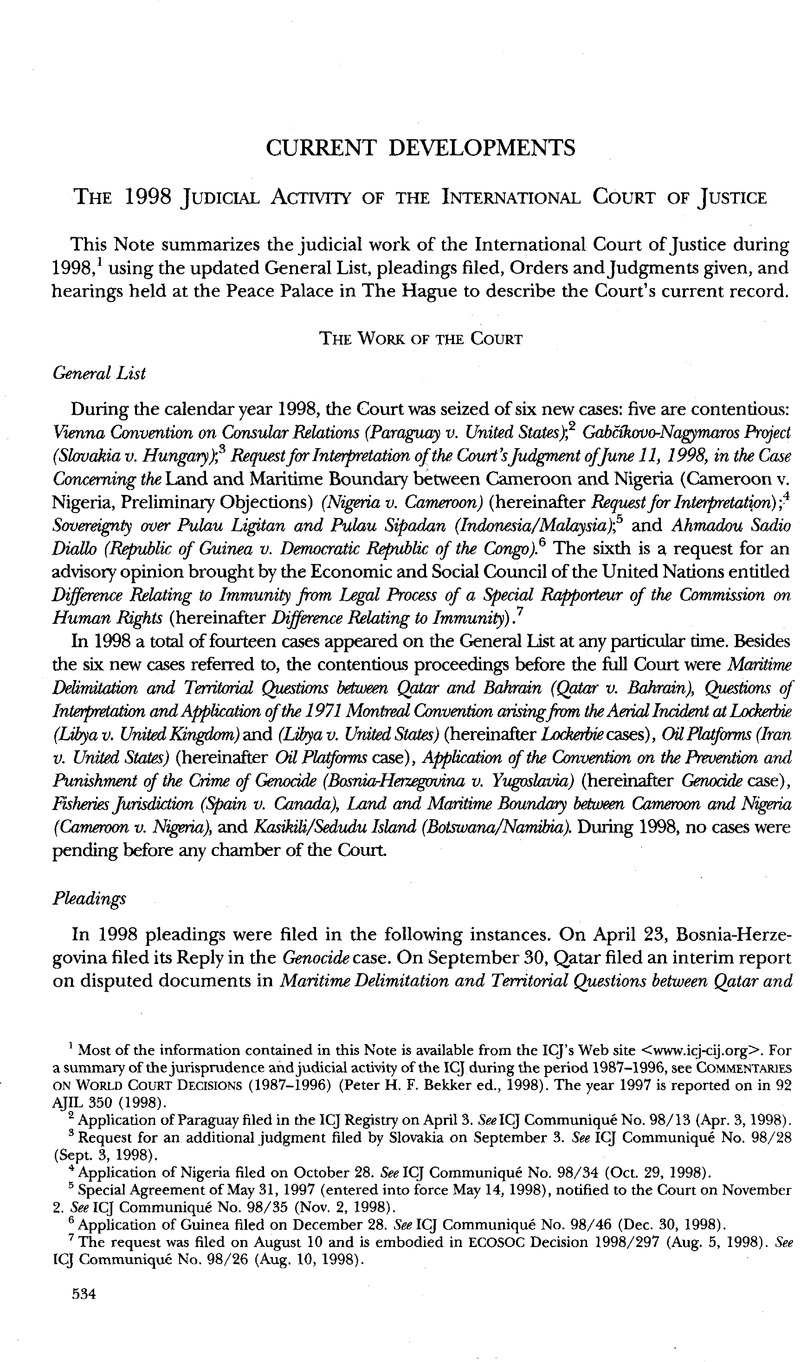No CrossRef data available.
Article contents
The 1998 Judicial Activity of the International Court of Justice
Published online by Cambridge University Press: 27 February 2017
Abstract

- Type
- Current Developments
- Information
- Copyright
- Copyright © American Society of International Law 1999
References
1 Most of the information contained in this Note is available from the ICJ’s Web site <http://www.icj-cij.org>. For a summary of the jurisprudence and judicial activity of the ICJ during the period 1987–1996, see Commentaries on World Court Decisions (1987–1996) (Peter H. F. Bekker ed., 1998). The year 1997 is reported on in 92 AJIL 350 (1998).
2 Application of Paraguay filed in the ICJ Registry on April 3. See ICJ Communiqué No. 98/13 (Apr. 3,1998).
3 Request for an additional judgment filed by Slovakia on September 3. See ICJ Communiqué No. 98/28 (Sept. 3, 1998).
4 Application of Nigeria filed on October 28. See ICJ Communiqué No. 98/34 (Oct. 29, 1998).
5 Special Agreement of May 31, 1997 (entered into force May 14, 1998), notified to the Court on November 2. See ICJ Communiqué No. 98/35 (Nov. 2, 1998).
6 Application of Guinea filed on December 28. See ICJ Communiqué No. 98/46 (Dec. 30, 1998).
7 The request was filed on August 10 and is embodied in ECOSOC Decision 1998/297 (Aug. 5, 1998). See ICJ Communiqué No. 98/26 (Aug. 10, 1998).
8 Full Court Orders fixing time limits were issued in Kasikili/Sedudu Island (Feb. 27), Maritime Delimitation and Territorial Questions between Qatar and Bahrain (Mar. 30), Land and Maritime Boundary between Cameroon and Nigeria (June 30), and Sovereignty over Pulau Ligitan and Pulau Sipadan (Nov. 10). Orders extending time limits were issued in the Oil Platforms (Dec. 8) and Genocide cases (Dec. 11). President Schwebel’s Order of January 22 extended time limits in the Genocide case. Vice-President Weeramantry issued three such Orders, in Vienna Convention on Consular Relations (Apr. 9, fixing time limits); Oil Platforms (May 26, extending time limits), and Vienna Convention on Consular Relations (June 9, extending time limits); and the senior judge,Judge Oda, issued four such Orders, in Difference Relating to Immunity (Aug. 10, fixing time limits); Request for Interpretation (Oct. 29, fixing time limits), and Lockerbie (Libya v. UK) and (Libya v. U.S.) (Dec. 17, extending time limits).
9 For a summary of this decision, see 92 AJIL 508 (1998).
10 Slip opinions available from the ICJ Registry and the ICJ’s Web site, supra note 1. These decisions are summarized in 92 AJIL 503 (1998).
11 Slip opinion available from the ICJ Registry and the ICJ’s Web site, supra note 1. For a summary of this decision, see 92 AJIL 751 (1998).
12 The full texts of the Address by the President of the International Court of Justice, Judge Stephen M. Schwebel, to the General Assembly of October 27, 1998 [hereinafter President’s Address], and Statement by Judge Schwebel to the Sixth Committee of October 30, 1998, are available at the ICJ’s Web site, supra note 1. Attached to the Court’s annual report is its response to General Assembly Resolution 52/161, para. 4 (Dec. 15, 1997), inviting the Court to submit its “comments and observations on the consequences that the increase in the volume of cases before the Court has on its operation.” See Consequences that the increase in the volume of cases before the International Court of Justice has on the operations of the Court, Report of the Secretary-General, UN Doc. A/53/326/Corr.1 (1998).
13 President’s Address, supra note 12.
14 See UN Docs. A/53/7/Add.6, and A/C.5/53/L.27 (1998). For the Report of the Secretary-General containing slightly different proposals, see UN Doc. A/C.5/53/11 (1998).
15 See UN Doc. A/C.5/53/L.27, at 14, paras. 26–28 (1998). For the text of the draft resolution, see id. at 20, and UN Doc. A/C.5/53/L.25 (1998). In accordance with Article 32(5) of the ICJ Statute, the salaries, allowances and compensation of the Members of the Court shall be fixed by the General Assembly and may not be decreased during their term of office.
16 See GA Res. 45/250B (Dec. 21, 1990). Under the old regime, a judge who had served one full nine-year term received a pension of $50,000 and a judge who had completed two full terms received $75,000, with proportionate reductions forjudges having served less than a full term. According to Article 32(7) of the ICJ Statute, Members of the Court are entitled to retirement pensions whose specific conditions are governed by regulations adopted by the General Assembly. The Assembly adopted a change in Article 7(2) of the Pension Scheme Regulations whereby any revision of pension payments will automatically be based on the same percentage and the same effective date as salary adjustments. See UN Doc. A/C.5/53/L.27, at 20 (1998).
17 These judges will continue to be entitled to receive one three-hundredth of the pension benefit for each further month of service past nine years, up to a maximum pension of two-thirds of annual salary. The new pension regime will be implemented in three stages: (1) January 1, 1999, pension level increases by 20% to $60,000; (2) January 1, 2000, level increases another 16.7% to $70,000; and (3) January 1, 2001, level increases by a further 14.3% to $80,000. See UN Doc. A/53/7/Add.6, at 4, para. 17 (1998). Finally, the Assembly decided to maintain the level of the special allowances of the President ($15,000 a year) and the Vice-President when acting as President ($94 a day, subject to a maximum of $9,400 per year) and the compensation system for judges ad hoc (one three-hundred-and-sixty-fifth of the annual salary of a member of the Court for each day they exercise their functions in the case for which they were appointed).


